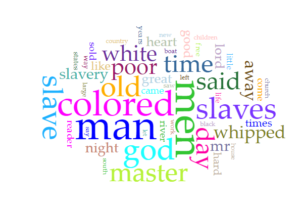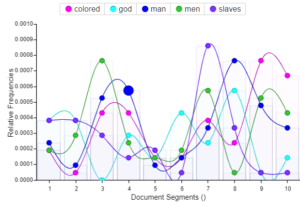For this week’s assignment, I decided to select the theme of religion and pose the research of question of “did people who were enslaved for extremely long periods of time still believe in God?” This question is interesting to me because it calls into question how enslaved people perceived religion, and to an extent Christianity and God himself, when they had to endure the atrocities of slavery for such tremendously long amounts of time . Did they see God as the perpetrator of all the evil they were surrounded by throughout their lives, that no benevolent deity could allow such an atrocity to happen? Or did they see him as the source of strength that allowed them to carry on, stay alive another day and cling to life, while they waited to reach a better place ( whether it was on the physical Earth or above it)?
This question was actually inspired by Geddy Lee, the bassist and vocalist for progressive rock band Rush (one of my personal favorite bands ever). In an interview on UN International Holocaust Remembrance Day, Geddy was asked to tell the story of his parents, who both had been imprisoned in concentration camps during World War II. During the interview, Geddy was asked whether he believed in God and whether his mother believed in God. He replied: “I am not a believer in God…witnessing what my family went through, to me, was proof that there was no God…My mom is very religious, always has been very religious.” It was very interesting to me to see that two people from the same family having those experiences could have the completely different viewpoints on such a tragedy, and I wondered if the same moral question could be logically applied to slavery in America.
In Voyant, I utilized the document “Life and Narrative of William J. Anderson, Twenty-four Years a Slave”, written by William J. Anderson in 1811.


From these two images, we can see that the word “god” is the fourth-most used word in the entire text, only behind “colored”, “men”, and “man”. The word “god” is even larger than many other words that are associated with the horrors of slavery, such as “slave”, “whipped”, “poor”, and “master”. This implies that at least in William Anderson’s case, but possibly for many other enslaved people, that being enslaved did not destroy their steadfast belief in God and in Christianity.
Text analysis is helpful because it is a very efficient way of determining which key words and topics are discussed in a given text, as well as assigning objective totals to how much those things are mentioned instead of the reader having to form a vague mental construct of “topic x was discussed a lot”. However, there are disadvantages to text analysis as well. In Voyant specifically, you can only track the number of times one specific word is said, and not strings of words of varying lengths. Therefore you can’t really observe the context of each time the word is used in the text just from the text analysis alone. So even though the word “God” is used many times, we have no idea the context of each time it is used. For all we know, Anderson could’ve said “God’s not real” 55 times throughout this passage and there would be no way of actually knowing that from the text analysis. That being said, text analysis is ultimately a useful tool for obtaining a general over of the text you are attempting to analyze and which topics are being discussed.

I think the broadness of your research question was a good approach towards text analysis so that your results could direct your thinking on this issue. I also think your analogy using Geddy Lee from Rush (I’m also a Rush fan!) is a perfect example of how trauma can either bring someone closer to faith or push them away. I think we often correlate religion and slavery as being interrelated on the path to freedom and abolition (and it certainly played a role), but we need to do a deeper dive in this area of inquiry– exactly what your question entails! Your analysis using William Anderson’s account sheds some insight and I agree that when comparing the frequencies of “God” to other terms, it seems that these subjects could be seen as somewhat distinctive. Or, at the very least, we could take them as both connected and on their own terms. I also wonder what a wider and directed search would show– like adding more terms related to religion/faith/Christianity and tracing their total presence throughout the document. I also really appreciate your thoughts about the benefits and disadvantages of text analysis– thank you for such great examples and insight!